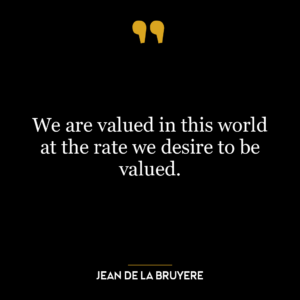This quote suggests that when we are not content or satisfied with who we are, we tend to desire to emulate others more. This dissatisfaction with our own identity can stem from various factors such as lack of self-esteem, self-acceptance, or self-love. When we fail to find value and worth within ourselves, we tend to seek it externally, often by trying to mimic those around us whom we perceive as successful, happy, or admired. This might lead to losing our authentic selves in the process.
In the context of personal development, this quote can serve as a reminder of the importance of self-acceptance and self-love. It encourages us to embrace our unique qualities and individuality rather than trying to fit into societal norms or expectations. It’s about finding satisfaction in being ourselves, with all our strengths and weaknesses, and not feeling the need to compare ourselves with others or to live up to an ideal image.
In today’s world, this idea is particularly relevant considering the influence of social media. People often present an idealized version of their lives on these platforms, which can lead to others feeling inadequate and desiring to be more like them. This can lead to a vicious cycle of dissatisfaction and imitation. But by finding satisfaction in being ourselves, we can break this cycle and foster a healthier relationship with ourselves and others.
In terms of personal development, this quote encourages us to focus on self-improvement and growth based on our own standards and not others. It’s about recognizing our own value and potential, and using that as a foundation for personal development and growth. It suggests that the more we are satisfied with ourselves, the less we will feel the need to be like others, and the more we can focus on becoming the best version of ourselves.










